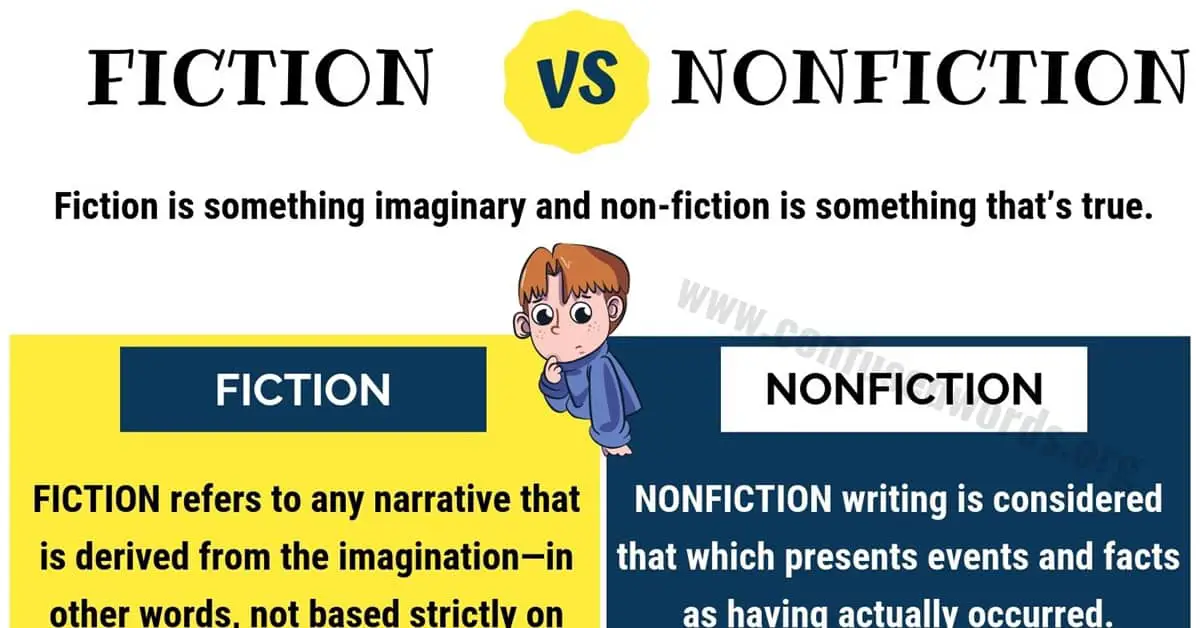Have you ever found yourself so engrossed in a book or movie that you felt like you were actually living in that world? Maybe you felt a pang of sadness for a fictional character’s loss or cheered along with them in their victories. If you have, you’re not alone. Fiction, with its power to transport us to other times, places, and realities, has captivated humans for centuries. But does that make it a mere fabrication, a world of “fake” stories? Or does fiction hold a deeper, perhaps even real, truth?

Image: www.behance.net
The question of whether fiction is fake or real has been pondered by philosophers, artists, and everyday readers alike. Fiction, by definition, is a genre of storytelling that is imagined and not based on verifiable facts. Yet, the stories woven within its pages can resonate with us on a profound level, touching upon universal emotions, exploring complex themes, and offering insights into the human experience. It is this very quality – the capacity to evoke such powerful emotions and reflections – that makes us wonder if there’s more to fiction than simple fabrication.
Realism and Fantasy: The Fabric of Fiction
Fiction encompasses a wide spectrum of stories, from realistic depictions of everyday life to fantastical tales of dragons and magic. We often call stories that closely mirror reality “realist” fiction, while those that embrace the impossible are classified as “fantasy,” “science fiction,” or “magical realism,” among other genres. But even in the most fantastical stories, there is a core of human experience, of emotions and motivations that we can all relate to.
Think of the stories we tell each other every day, the anecdotes that shape our understanding of the world. They often have elements of narrative, of characters, of a beginning, middle, and end, and even though they are grounded in our own reality, they can also be embellished, dramatized, and even invented to make a point or entertain. The line between our own “real” stories and the fictional ones we read is not always as clear as we might think.
Mirrors of Reality: How Fiction Reflects Our World
One of the most intriguing aspects of fiction is its ability to reflect our own reality, albeit through a distorted lens. Great works of fiction often explore societal issues, personal struggles, and the complexities of human relationships. They can offer new perspectives, challenge our assumptions, and even inspire social change, much like real-life events.
Consider the impact of novels like “Uncle Tom’s Cabin” or “To Kill a Mockingbird.” These works, while fictional, played a significant role in raising awareness about the injustices of slavery and racism, contributing to real-world movements for change. Fiction can act as a catalyst for introspection and societal transformation, prompting us to examine our own values and beliefs.
The Power of Empathy: Fiction’s Gift to Us
One of the most powerful ways fiction can impact us is by fostering empathy. Through relatable characters and compelling narratives, we can step into the shoes of others, experiencing their joys, sorrows, fears, and triumphs. This vicarious experience can broaden our understanding of diverse perspectives and deepen our compassion for those different from ourselves.
Take, for instance, a novel like “The Kite Runner” that explores the themes of loyalty, betrayal, and redemption. By immersing readers in the protagonist’s journey, the novel sheds light on the complexities of Afghan culture, the impact of war, and the universal longing for forgiveness. This emotional engagement can make us more open to understanding the experiences of others and contribute to a more compassionate world.

Image: confusedwords.org
Beyond Entertainment: Fiction as a Source of Truth
While fiction may not be directly based on factual events, it can hold a different kind of truth – what we call “emotional truth.” It can capture the essence of human emotions, the complexities of relationships, and the enduring themes that resonate across cultures and time. This emotional truth can be even more powerful than factual information, touching upon the core of our being and offering insights into our own lives and motivations.
Think of a poem like “The Raven” by Edgar Allen Poe. While the story itself is imaginary, its exploration of grief, loss, and the haunting nature of memory resonates deeply with anyone who has experienced the pain of heartache. This is the power of fiction: to delve into the human experience in a way that goes beyond the literal and speaks to our shared humanity.
The Role of the Reader: Engaging with Fiction
Ultimately, the impact of fiction depends on the reader. An active engagement, a willingness to be transported, and an openness to the emotional power of storytelling can elevate fictional experiences from mere entertainment to profound encounters with human experience.
Reading a novel, watching a film, or even listening to a radio drama can be an opportunity for self-discovery, for exploring new perspectives, and for developing greater empathy for others. The power of fiction lies not just in the stories themselves but also in our ability to connect with them, to find ourselves within their narratives, and to be changed by their truths.
Is Fiction Fake Or Real
Embracing the Power of Imagination: Living with Fiction
Fiction isn’t merely “fake.” It’s a powerful tool that allows us to explore the vast landscapes of human emotions, morality, and the complexities of the universe. It can offer us a glimpse into the unknown, challenge our assumptions, and inspire us to become better versions of ourselves. By embracing the power of imagination, we open ourselves to a world of possibilities, growing our empathy, understanding, and even our own creativity.
So next time you pick up a book, watch a movie, or simply listen to a captivating story, remember that you are stepping into a world of possibilities. You are engaging with a form of storytelling that has the power to entertain, enlighten, and inspire, and in doing so, you are tapping into the very essence of human experience.

:max_bytes(150000):strip_icc()/OrangeGloEverydayHardwoodFloorCleaner22oz-5a95a4dd04d1cf0037cbd59c.jpeg?w=740&resize=740,414&ssl=1)




